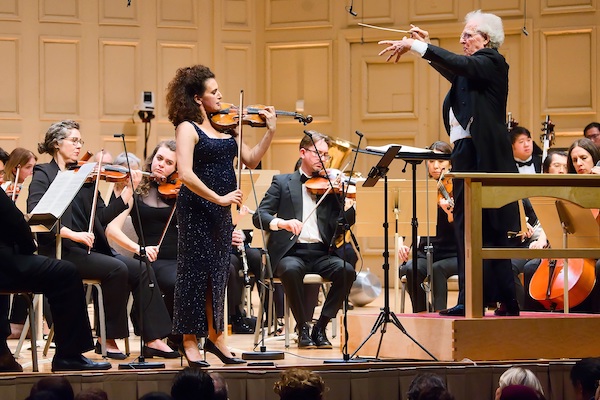Concert Review: The Boston Philharmonic Performs Ravel, Berg, and Mahler
By Jonathan Blumhofer
The Boston Philharmonic Orchestra was violinist Liza Ferschtman’s equal partner for much of the performance, imbuing Alban Berg’s dense orchestral writing with warmth and shapeliness.

Violinist Liza Ferschtman performing with Benjamin Zander and the Boston Philharmonic Orchestra. Photo: Hilary Scott
Good things, the proverb tells us, come to those who wait. The adage proved true for the crowd who heard the Boston Philharmonic Orchestra and conductor Benjamin Zander at Symphony Hall on Saturday night (either in person or online), the pairing’s first concert since mid-November.
To mark the occasion, Zander and Co. brought with them an old friend, violinist Liza Ferschtman, back in town for the first time since her debut with these forces in 2019. That time around, Ferschtman played Beethoven’s Violin Concerto. For this outing, she assayed Alban Berg’s.
The Berg Concerto, the composer’s last completed work, was finished in the summer of 1935 as a memorial for Manon Gropius, the ill-fated, 18-year-old daughter of Gustav Mahler’s wife, Alma, and her second husband, Walter Gropius. It famously incorporates a quotation of J.S. Bach’s harmonization of the chorale Es ist genug into its finale; a few other wistful allusions also emerge.
While it’s easy to get hung up on the Concerto’s blend of tonal and atonal syntaxes — Berg’s compositional technique was, after all, masterful — in general, issues of pitch organization take a back seat to the score’s expressive immediacy. They certainly did so on Saturday.
Playing with rich tone and bracing focus, Ferschtman dispatched the solo part with blistering intensity. The first movement’s lyrical, dancing figurations were all well directed, while the finale’s violent opening pages seethed. Meantime, its culminating, mellifluous episodes soared.
Throughout, the violinist displayed a remarkable capacity to project her instrument through and above the orchestra. True, Zander led an accompaniment that was, on the whole, lucid and well balanced. Even so, Ferschtman’s ability to achieve maximum volume without once forcing her sound or corrupting the beauty of her tone production (both in the Berg and in her encore of Eugene Ysaÿe’s “Sunrise”) was exceptional.
The Philharmonic was Ferschtman’s equal partner for much of the reading, imbuing Berg’s dense orchestral writing with warmth and shapeliness. Some tentative moments near the end notwithstanding, theirs was a richly Romantic account of this work, an approach that tied in neatly to the night’s other big offering, Mahler’s Symphony No. 1.
Though Zander’s an old hand at Mahler, that doesn’t mean he’s one to settle for complacency in this music. Rather, Saturday’s rendition of the First Symphony made a point of illuminating new aspects of an otherwise familiar work.
Accordingly, the first movement unfolded as a study in delicate textures and small details. Burbling low string lines here, chirping woodwinds there, and gossamer atmosphere all around were offset by cathartic, mighty climaxes. The ländler sounded like a true, thumping country dance, snapping right along and with thrilling vigor.
In the funeral march, Anthony D’Amico intoned the opening double bass solo with inviting precision and Zander’s restrained but taut tempos resulted in a moment of electrifying release at the start of the finale. That last movement itself was smartly paced, nicely shaded, and driven with exhilarating spirit over its closing pages.
Though it wasn’t always the most polished Mahler First on record (among other things, cracks in the brasses marred the final drive to the double-bar), Saturday’s was, interpretively, an entirely satisfying traversal — as fine in many regards as Bernard Haitink’s superb account from 2016.
Also striking was the BPO’s opener, Maurice Ravel’s Pavane for a Dead Princess. While tempos perhaps veered close to being too stately, the orchestra’s account of this favorite emerged with pristine radiance. Indeed, Saturday’s seemed to be a vision of a melancholy procession unfolding from afar, a sonic reminder of Thomas Campbell’s dictum that “distance lends enchantment to the view.”
Jonathan Blumhofer is a composer and violist who has been active in the greater Boston area since 2004. His music has received numerous awards and been performed by various ensembles, including the American Composers Orchestra, Kiev Philharmonic, Camerata Chicago, Xanthos Ensemble, and Juventas New Music Group. Since receiving his doctorate from Boston University in 2010, Jon has taught at Clark University, Worcester Polytechnic Institute, and online for the University of Phoenix, in addition to writing music criticism for the Worcester Telegram & Gazette.
Tagged: Benjamin-Zander, Boston Philharmonic Orchestra

Congratulations Liza! So wished I could have been there. The live stream didn’t get past the Canadian cyberspace border for some strange reason. Until next time……..